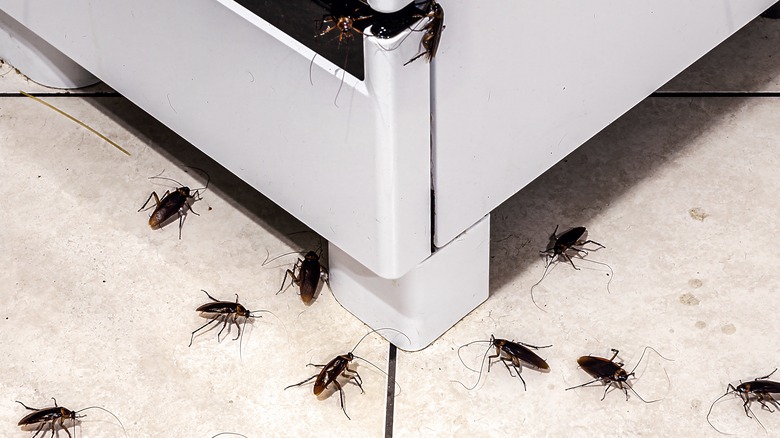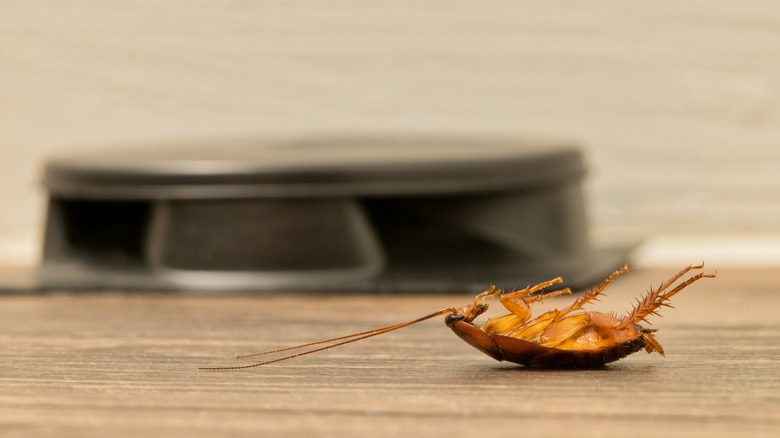The Unexpected Sign That You May Have A Cockroach Problem In Your Home
The endless coughing. The stuffy nose that makes it difficult to breathe. The red patches on your arms that you can't stop scratching. If you're experiencing these common allergy symptoms, you probably put it down to the changing seasons, which bring pollen-filled air that wreaks havoc on those of us prone to allergies or asthma. However, these symptoms could be pointing to something surprising. Did you know you can use them to determine which pest is infesting your home? As cockroaches adventure around your house in search of food, water, and places to hide or lay their eggs, they leave bits of their body, their spit, and even their poop(!) on various surfaces.
Touching, inhaling, or consuming these nasty substances can, for certain people, lead to allergic reactions resembling those from dust mites. Thankfully, the fixes for this issue, while not necessarily easy, are DIY in most cases. Start by cleaning away all of the nasty allergy-causing stuff that cockroaches leave behind. It's especially crucial to get rid of any dust in the air because it contains the minute dried cockroach bits triggering your allergies. Mop floors and wipe down walls and counters daily. If you vacuum, dispose of the dust outdoors and wear a mask. Keeping your home well-ventilated (keep the air moving) and lowering humidity can help reduce allergens, too.
Invest in cockroach extermination
A thorough clean is a vital step in the allergy reduction mission, but unless you tackle the root of the problem, you'll keep experiencing symptoms — and all the other gross stuff that comes with an infestation. Place traps, always starting with the least toxic options available, near places they prefer (dark, damp crevices) to get an idea of numbers and, hopefully, reduce or exterminate your unwanted six-legged house guests. Though all cockroaches have allergen potential, two species are the worst: The German cockroach (Blatella germanica) and the American cockroach (Perplaneta americana). Keep this in mind when purchasing pest control products since some species are becoming immune to certain pesticides.
Whatever strategies you employ, be patient; you're not going to get rid of cockroaches overnight, particularly if you uncover an extensive infestation. Keep in mind, too, that forking out for professional exterminators and cleaning services might be necessary to eliminate the problem — especially in inner-city properties, where studies have found that standard home cleaning isn't enough. Cockroaches are incredibly hardy critters, so don't be surprised if the exterminator advises a course of treatments spread out over several visits.
Prevention is the key to a cockroach-free home
Once the cockroaches are gone, you'll need to work hard to prevent them from coming back if you want to keep your home allergen-free. In the kitchen, fix leaking taps immediately, store all your food in air-tight, sealed containers, and don't let kitchen trash pile up (i.e. take it outside to your big garbage can regularly). Elsewhere in the house, banish piles of paper products (it's finally time to recycle all those Amazon boxes you've been hoarding!), identify and seal holes and cracks open to the outside, and regularly disinfect surfaces.
Of course, allergy symptoms are just one sign of a cockroach invasion, and a subtle one at that. The reactions you or other members of your household are experiencing could be attributed to other allergens. If you've expelled both the cockroaches and their mess from your home and still have symptoms, you'll need to do some troubleshooting to discover the cause. Home-based allergies can result from houseplants, dust mites, pet dander, and fungi (mold and mildew, not mushrooms), with each cause requiring different remedies, though there is some overlap. For example, most people who are allergic to cockroaches are also allergic to dust mites, and treatment for both is largely the same.


